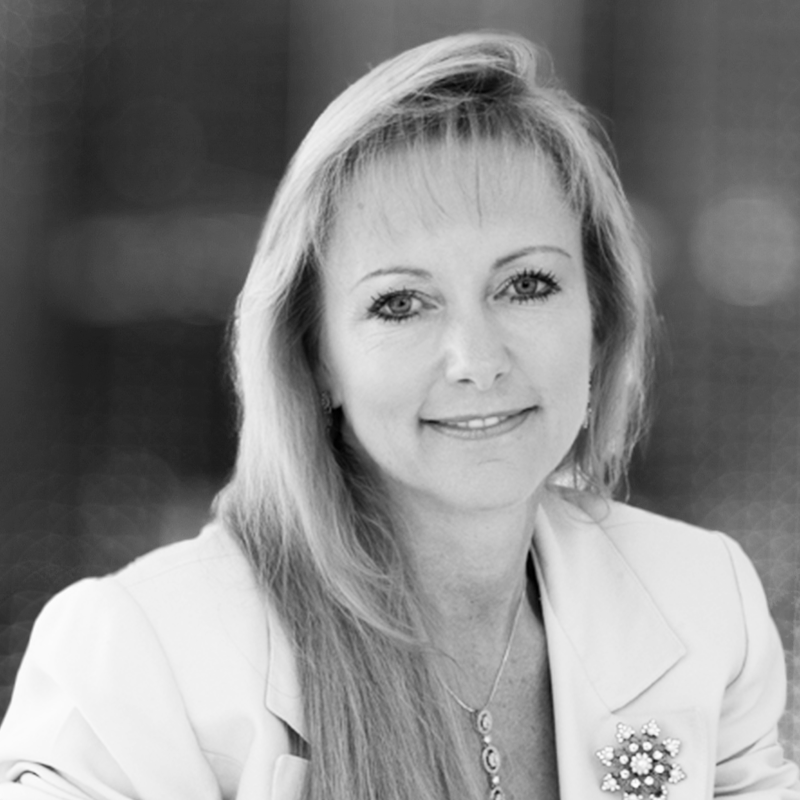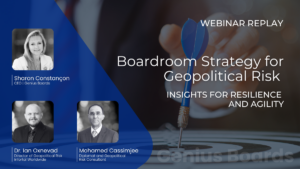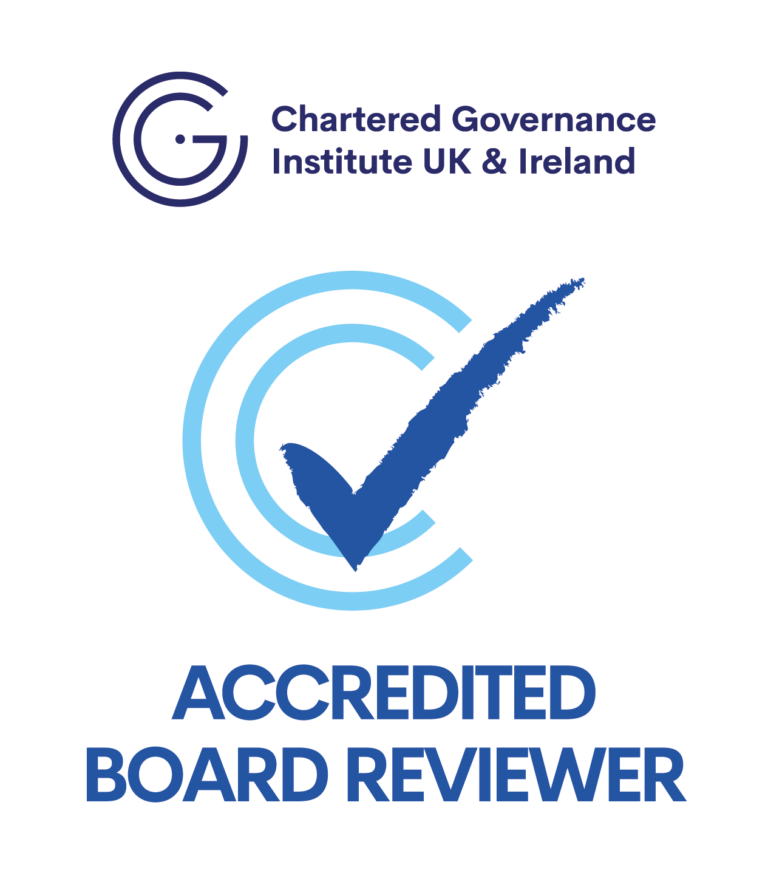DEI is at a crossroads. As some companies pull back on their commitments, boards are faced with a strategic choice: step back—or step up. With increased scrutiny from stakeholders, political tension on a global scale, and shifting employee expectations, the role of the board in leading Diversity, Equity, and Inclusion has never been more critical.
In this high-impact webinar, hosted by Sharon Constançon, CEO of Genius Boards, expert panellists Michael Cole-Fontayn, Sandie Allimadi, and Peter Swabey explore how boards can embed DEI into governance strategy—not as a compliance exercise but as a pathway to resilience, innovation, and competitive edge.
Watch the replay to hear actionable insights on how boards can move beyond box-ticking, foster inclusive leadership, and ensure DEI becomes a natural, measurable outcome of strong governance.
Key Take Aways:
In this timely and thought-provoking discussion, our expert panel explored how boards can lead DEI strategy from the top—moving beyond performative gestures to embed meaningful, measurable action into governance structures. From global pressures and stakeholder expectations to risk management and talent retention, the conversation uncovered what forward-thinking boards are doing differently and why the Genius IED Model (Inclusion → Equity → Diversity) offers a practical and sustainable path forward.
Introduction & Panel Introductions
- Sharon, introduces the session’s focus on diversity, equity, and inclusion (DEI).
- She outlines the backgrounds of the panel: Michael Cole-Fontayn, with a career in financial services and advocacy for equity and inclusion; Peter Swabey, a governance expert with extensive company secretarial experience; and Sandie Allimadi, joining shortly to contribute to the DEI discussion.
The Importance of Governance in DEI
- Governance is positioned as the foundation of effective DEI strategy.
- Sharon shares an example of a £600 million business failure due to weak governance.
- Boards must mature their governance to create stable environments for DEI to thrive.
- Treating people equitably, fostering psychological safety, and integrating people policies within governance are essential.
- Governance (G) is reframed as the starting point within ESG, rather than an afterthought.
Challenges in Board Diversity & Governance
- Peter notes that while diversity is improving in the FTSE, smaller companies face ongoing challenges.
- Many boards limit their candidate pool by requiring previous CEO or CFO experience.
- The role of the nomination committee is emphasised—boards must look wider, deeper, and further ahead when selecting directors.
- Recruitment practices need to be challenged to diversify board talent pipelines.
Personal Experiences & Inclusive Leadership
- Sandie shares personal experiences with non-inclusive behaviour and the lack of readiness to integrate diverse voices in leadership.
- Inclusion must be intentional—not performative—to ensure credibility and engagement.
- Sharon highlights a board evaluation case where exclusive behaviour undermined an otherwise well-intentioned diversity effort.
- Training and education are needed to challenge unconscious bias and embed inclusion.
Financial Services & DEI
- Michael reflects on global political pressures—particularly from the US—and how they influence corporate DEI strategies.
- Boards must show courage and reaffirm the business case for DEI during times of retrenchment.
- Business resource groups are vital for driving inclusive practices and supporting diverse talent.
- DEI must be embedded in business strategy, not treated as a standalone initiative.
Balancing Cognitive & Experiential Diversity
- Sharon and Michael discuss the value of different thinking styles and lived experiences in board decision-making.
- A strong corporate secretariat can support chairs in fostering effective, inclusive governance.
- Boards benefit from spending time together outside formal meetings to strengthen dynamics and alignment.
- Talent and professional development should be recurring items on board agendas.
Risk Management & DEI
- Sharon and Peter explore the role of risk committees in integrating DEI into board oversight.
- Risk committees must move beyond regulatory checklists and consider the broader risks of failing to be inclusive.
- Boards must view DEI through a long-term sustainability lens—integrating it as part of good business.
- DEI should be framed as a strategic risk and opportunity, not just a compliance issue.
Empowering Employees & Developing Talent
- Sandie emphasises the need to empower employees through awareness, access, and aspiration.
- Boards can plant seeds of ambition by making non-executive board roles more visible and attainable.
- Training and development must be equitable across the workforce—not limited by role, seniority, or bias.
- HR must be held accountable for providing inclusive career development pathways.
Final Thoughts & Advice
- Peter underscores the value of professional networks and involvement in industry bodies.
- Sandie encourages individuals to be proactive in their career development and board ambitions.
- Michael highlights the importance of mentoring, networking, and personal leadership beyond formal organisational structures.
- The session concludes with a call to action: boards must lead by example, embed DEI in their culture, and empower individuals at all levels.
Featured Article
Diversity, Equity, and Inclusion (DEI) has been under renewed scrutiny as major organisations pull back from once-public commitments.
Our latest article explores how boardrooms can embed DEI into their governance frameworks, not as a compliance exercise but as a strategic enabler.
Ready to lead DEI from the top?
Empower your board with the tools and mindset to turn DEI into a competitive advantage—not just a compliance checkbox.
Host
Sharon is a highly accomplished CEO with a diverse range of experience across several businesses. She currently serves as the CEO of Genius Boards Limited, and Valufin Limited, in addition to her role as Chairman of the South African Chamber of Commerce UK. Sharon is a corporate governance specialist and foreign currency adviser, known for her impressive track record of achieving results. As an energetic entrepreneur with a sharp eye for risk, Sharon is skilled in recognising opportunities and understanding the importance of good governance.
One of Sharon’s key strengths is her deep understanding of board behaviours, leadership, and regulated industries. She uses this expertise to deliver truly insightful and practical board evaluations. In addition, Sharon serves as a mentor and coach to chairmen and directors and is a passionate advocate for the company secretary role.
Sharon is also a respected educator and shares her knowledge and experience as a lecturer for the Qualifying Level Boardroom Dynamics course for the Chartered Governance Institute UK & Ireland. Additionally, she serves as a faculty member of The Corporate Governance Institute, delivering risk training to corporate leaders. Overall, Sharon is a dynamic leader with a wealth of experience and expertise in corporate governance, leadership, and risk management.
Guest Speakers
Michael Cole-Fontayn is the Chairman of the Chartered Institute for Securities and Investment (CISI) in the UK. He previously spent 35 years with BNY Mellon, serving as Chairman for Europe, the Middle East, and Africa.
Throughout his career, Michael has been a strong advocate for Diversity, Equality, and Inclusion (DEI). At BNY Mellon, he led the EMEA Diversity and Inclusion Council, shaping regional strategies to ensure DEI priorities were culturally appropriate across offices. Under his leadership, BNY Mellon signed the HM Treasury’s Women in Finance Charter in July 2016, publicly committing to workforce diversity.
Beyond his corporate roles, Michael mentors under the 30% Club programme, serves on the steering committee of Mission Include, and is a patron for Women in Banking and Finance (WIBF).
He actively supports conversations around workforce equality, LGBT rights, and mental health, reflecting his commitment to fostering inclusive environments.
Sandie Allimadi has over 15 years of experience as an award winning Communications Strategist, leading high profile campaigns, stakeholder engagement and new business development across diverse global markets in the Middle East and East Africa.
Known for her expertise in reputation management and crisis communications, she has played a pivotal role in shaping brand narratives and workplace wellbeing initiatives, serving as a trusted advisor to both corporate and government clients.
Sandie is also a Co-Active trained coach and a values-driven advocate of inclusive career development, particularly the provision of a welcoming and nurturing environment for candidates to excel.
She holds an MSc Media and Communication Governance from the London School of Economics and Political Science and a BA (Hons) Journalism Studies from the University of Stirling.

Peter Swabey
Policy and Research Director
The Chartered Governance Institute UK & Ireland (CGIUKI)
Peter Swabey is the Policy and Research Director at the Chartered Governance Institute UK & Ireland (CGIUKI), where he leads the Institute’s thought leadership, research, and policy initiatives on governance and corporate responsibility.
With over 30 years of experience in corporate governance and regulatory affairs, Peter is a leading authority on boardroom dynamics, shareholder engagement, and governance best practices. He has played a key role in shaping governance policy and advising boards on how to adapt to evolving regulatory and stakeholder expectations.
Before joining CGIUKI, Peter was Director of Corporate Governance at ICSA (now CGIUKI), where he led major research projects on board effectiveness and shareholder communications. He regularly engages with government bodies, regulators, and business leaders to drive improvements in governance standards across the UK and internationally.
Peter is a frequent speaker at industry events and a trusted commentator on governance issues, known for his insightful analysis and practical recommendations for boards.














